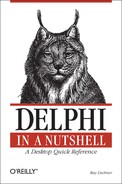Name
Array Keyword
Syntax
typeName= array[Index type] ofBase type; // static array type typeName= array[Index type, ...] ofBase type; // static array type typeName= array ofBase type; // dynamic array typeName: array ofBase type// open array as a subroutine parameterName: array of const // open variant array as a subroutine parameter
Description
Delphi has several different kinds of arrays: static arrays, dynamic arrays, and open arrays:
A static array is a traditional Pascal array. You can use any ordinal type as an index, and an array can have multiple indices. The size of a static array cannot change at runtime.
A dynamic array is an array whose index type is
Integerand whose size can change while the program runs. The lower bound of the index is always zero, and the upper bound is set with theSetLengthprocedure. To copy a dynamic array, call theCopyprocedure. Assigning a dynamic array assigns a reference to the array without assigning the array’s contents. Delphi uses reference counting to manage the lifetime of dynamic arrays. Unlike strings, Delphi does not use copy-on-write for dynamic arrays.A subroutine parameter can be an open array. You can pass any static or dynamic array to the subroutine. Delphi passes an additional, hidden parameter that gives the upper bound of the array. The subroutine cannot change the size of a dynamic array that is passed as an open array. Regardless of the index type of the actual array, the open array parameter uses an
Integerindex type, with zero as the lower bound.A special kind of open array is a variant open array, which is declared as
arrayofconst. Each element of the array is converted to aTVarRecrecord. The most common use for a variant open array is to write a subroutine that takes a variable number of arguments (such as theFormatfunction in theSysUtilsunit).An array of
AnsiChar,Char, orWideCharis special when the index is an integer range starting from zero. Delphi treats such an array as a string or wide string (unless you disable the$ExtendedSyntaxor$Xcompiler directives), except that you cannot pass a character array to a subroutine that has avarstring parameter. You can also pass an array reference as an argument to a subroutine that takes a parameter of typePCharorPWideChar. Delphi automatically passes the address of the first character in the array.Arrays are stored in column-major order, that is, the rightmost subscript varies fastest.
Examples
// Append a message to a log file. // See the example with AssignFile for the other overloaded // version of the Log procedure. procedure Log(const Fmt: string; const Args: array of const); overload; begin Log(Format(Fmt, Args)); end; // Append a random number to a dynamic array of integers. // Because dynamic arrays and open arrays use the same syntax, // you must use a named type for the dynamic array parameter. type TIntArray = array of integer; procedure AppendRandomInt(var Ints: TIntArray); begin SetLength(Ints, Length(Ints) + 1); Ints[High(Ints)] := Random(MaxInt); end; var Counter: Integer; TestInfo: string; Ints: TIntArray; I: Integer; begin ... Log('This is test #%d: %s', [Counter, TestInfo]); for I := 1 to 10 do AppendRandomInt(Ints); end.
